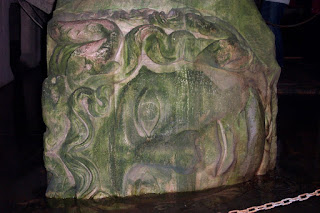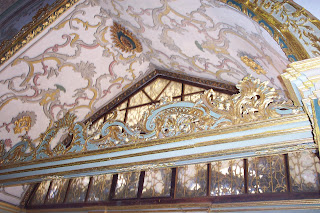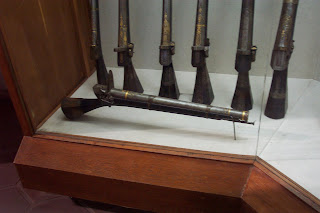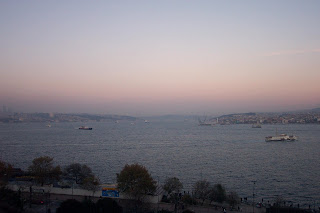Istanbul, Part II
So yesterday I left you all at the Grand Bazaar. I would like to jump from there to starting out Sunday at the Basilica Cistern, but Chachan at our hostel requires mention first. He was very friendly and chatty, and
 even managed to persuade your curmudgeonly correspondent to eat at the hostel for dinner. He was Kurdish (as apparently are the majority of workers in that district of Istanbul as I later found out) and of course spoke like a half-dozen different languages. I wish I had a picture of Meredith and I with him, instead you'll have to settle for a (washed out) shot of the street the hostel was on, sorry.
even managed to persuade your curmudgeonly correspondent to eat at the hostel for dinner. He was Kurdish (as apparently are the majority of workers in that district of Istanbul as I later found out) and of course spoke like a half-dozen different languages. I wish I had a picture of Meredith and I with him, instead you'll have to settle for a (washed out) shot of the street the hostel was on, sorry.The next day we set off bright and mid-morningish for the lovely streets of Sultanahmet (where no Westerner ever felt unloved by the tourist vendors) and the famed Basilica Cistern. This was also a project of the the emperor Justinian and quite an interesting space just to be in. It was underground of course, but it was very well set-up and reminded me of a huge indoor version of a pond in a park, at night. I thought they should put in little paddle boats that people could rent. None of my pictures came out that well except for the ones of the main archaeological attraction, the Medusa heads that served as pillar foundations. They reminded me a little too much of my boss. One was upside down and the other was sideways. This is actually why modern delivery boxes have the "THIS END UP" thing on them.


From the Cistern we headed east to the Topkapi Palace, former home of the sultan and his four hundred-plus wives. The grounds were fairly expansive for being in a city and pretty well-kept, so it was a very beautiful spot to walk around. The jewels on display were really impressive. In between bouts of retching at the level of unequal distribution of wealth it displayed I had to admire the craftsmen
 of that era and their skills. And the tones reflected in all the rubies and emeralds awed me near to silence before I remembered I was supposed to be disgusted by the decadence of it all. At least the guys had taste. Unfortunately they wouldn't let you take pictures of the bling, but trust me, it was pimpalicious. The picture on the left here is the entrance to the royal treasury.
of that era and their skills. And the tones reflected in all the rubies and emeralds awed me near to silence before I remembered I was supposed to be disgusted by the decadence of it all. At least the guys had taste. Unfortunately they wouldn't let you take pictures of the bling, but trust me, it was pimpalicious. The picture on the left here is the entrance to the royal treasury.The other room that really fascinated me was the one with all the guns. I'll admit that one of the reasons Ottoman history fascinates me is the way firearms were developed and used during that dynasty, especially by the imperial janissaries. The guns on display in Istanbul were certainly worth the cabinet space just for their designs and decorations, which were interesting and intricate. But the museum also got
 me thinking about what the origin of those firearms can tell us about their use in the world today. It is telling that they were used by the janissaries to guard the imperial palace and treasury, because those origins show that their first purpose was legitimation through force and the protection of power and accumulated wealth by the fear of force. On the right here we have the closest thing I could find to the Patrick Harper special.
me thinking about what the origin of those firearms can tell us about their use in the world today. It is telling that they were used by the janissaries to guard the imperial palace and treasury, because those origins show that their first purpose was legitimation through force and the protection of power and accumulated wealth by the fear of force. On the right here we have the closest thing I could find to the Patrick Harper special.the Archaeological Museum was also terribly fascinating, one of those places that I would take my kids and spend a week or two if I were homeschooling them here. I have to mention especially the Necropolis of Sidon which had some pretty impressive tomb engravings. All I can say is that when it's my time to go, someone had better carve some naked, partying Romans into my casket before I start pushing up petunias. There were also good r
 ooms on Byzantium, other sarcophagi, Bronze Age sculptures and Famous Mothers, but by that time Mery and I were both suffering from acute fullness of the brain, so we took a walk in the tea gardens next door, which were quite pleasant in the falling dusk. Once we got to the far end there was a great view of the Bosphorus from some cliffs that produced the picture on the left. The big treat that night was that Mery and i ran into our fellow SSI Mirelle Phillips at the Metropolis Cafe on the way back from dinner. We ended up talking with her and the guys who worked at the cafe for over four hours, and the illustrious Paul Berry stopped by also with our mutual acquaintance Andrew Tobolowsky.
ooms on Byzantium, other sarcophagi, Bronze Age sculptures and Famous Mothers, but by that time Mery and I were both suffering from acute fullness of the brain, so we took a walk in the tea gardens next door, which were quite pleasant in the falling dusk. Once we got to the far end there was a great view of the Bosphorus from some cliffs that produced the picture on the left. The big treat that night was that Mery and i ran into our fellow SSI Mirelle Phillips at the Metropolis Cafe on the way back from dinner. We ended up talking with her and the guys who worked at the cafe for over four hours, and the illustrious Paul Berry stopped by also with our mutual acquaintance Andrew Tobolowsky. That pretty much concludes the visual part of the presentation. But I would like to share that with no particular plans for what time we would leave on a bus, Mery and I left the hostel around ten thirty and walked/took the metro to the bus station on the European side. It was easier to get to than the one on the Asian side but probably has fewer buses for Ankara. At any rate, we roll up at 11:50 and I said "I hope there's a 12 o'clock bus". Ask and ye shall receive! I love it when that happens. This anecdote is actually partly an excuse for me to share the story of coming back from DC to Providence last year that I have forgotten I told most of you. In that instance, I was trying to find a cheap way home from a weekend of protesting and lobbying and ended up taking the Chinatown bus to NY, then to Foxwoods Casino where I slept under a craps table for a couple hours, then to Boston where I got a free donut by begging the Krispy Kreme guy, and finally to Providence. I had a 9am Colonial History (which actually has nothing to do with anyone's colon, disappointingly) lecture from Nobel Laureate Gordon Wood to get to, and managed to walk in the doorway wrapping up a 17-hour trip at 8:58. Now that's timing for you.





